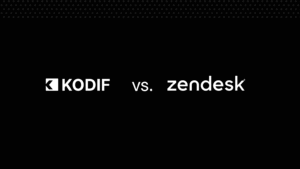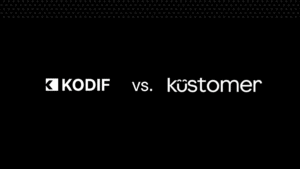If your automation can’t talk to your tech stack, it’s basically miming.
That’s the problem most ecommerce teams face. They buy into “AI automation,” only to realize their shiny bot can’t actually do anything; it can talk, but it can’t act.
Real automation happens when your AI integrates seamlessly with the platforms that power your business, from Shopify and Klaviyo to Recurly, Loop, all your warehouse tools, and so on and so on.
Without that connection, you’re not automating workflows, you’re just creating a slightly faster version of “let me check on that for you.”
Common questions brands ask about ecommerce integrations
When we research the most common issues and roadblocks for ecommerce brands, the same questions come up again and again, and they’re the exact ones your customers are probably searching, too:
- What tools should my ecommerce helpdesk integrate with?
- Why aren’t my automation workflows resolving issues end-to-end?
- How can integrations improve customer experience and ticket resolution?
- What are the best ecommerce integrations for order tracking or subscription management?
- How can I reduce “Where is my order?” (WISMO) tickets with better integrations?
These questions all come down to the same truth: your automation is only as powerful as the systems it’s connected to.
Integration is what turns conversation into action
When an AI agent has deep integrations, it can actually do things:
- Modify subscriptions, process refunds, or trigger replacements.
- Pull real-time order data from Shopify.
- Sync with Klaviyo for personalized offers.
- File return requests in Loop or process replacements in Shippo.
- Update your CRM, ping your warehouse, or trigger an email sequence automatically.
Without integrations, every one of those moments turns into a dead end for your customer or another ticket for your support team.
That’s why, at KODIF, we built our AI to integrate with over a hundred ecommerce tools.
When all of these systems talk to each other, your AI becomes an actual teammate, not just a chatbot.
Why integrations matter more than features
You can have the smartest AI in the world, but if it can’t connect to your order management system, it’s guessing.
Integrations are what give automation context. They make every conversation data-rich instead of data-blind.
Here’s why that matters:
- Speed = Satisfaction. When your AI can access real-time inventory, order status, and return policies, it resolves questions instantly instead of escalating them.
- Accuracy builds trust. No more “let me get back to you” moments. Integrated AI provides up-to-date answers straight from the source.
- Personalization that sells. Pulling data from Klaviyo, for example, means your AI can recommend products that make sense, not just “bestsellers.”
- Data that compounds. Integrations don’t just power automation, they make your reporting, tagging, and insights more valuable. You start seeing real patterns, not just noise.
It’s not about how smart your AI is, it’s about how connected it is.
The compounding ROI of connected automation
The brands that win with automation aren’t just deflecting tickets, they’re creating connected systems that work together to grow revenue and reduce friction.
For example:
- A beauty brand can connect KODIF + Shopify + Loop Returns to instantly process “wrong shade” exchanges.
- A health brand can link KODIF + Recharge + Klaviyo to skip or pause a supplement subscription and send a retention offer in the same conversation.
- A home & appliance company can pair KODIF + TrackingMore + Re:amaze to answer WISMO questions in real time and surface product manuals for quick fixes.
Each integration adds a layer of capability and the result compounds. More automations, faster resolutions, fewer tickets, and happier customers.
Integrations = insurance against friction
Disconnected tools are where most automation projects fail.
Every “we’ll get back to you” is a gap between systems. Every manual lookup, a workflow that could’ve been connected. Every missed upsell, a signal that never reached the right tool.
Integrations close those gaps. They make your customer experience resilient even when volumes spike or something breaks.
When your tech stack works together, your team can finally stop firefighting and start focusing on growth.
The KODIF approach
At KODIF, we think of integrations as the infrastructure of AI success. That’s why we built an open, extensible ecosystem that connects to the tools you already use and grows with your stack.
Our platform connects with 100+ ecommerce and CX platforms out of the box, so your AI doesn’t just talk to customers, it takes real action.
That means:
✔️ Refunds, exchanges, and returns handled instantly
✔️ Subscriptions updated automatically
✔️ Retention offers triggered in real time
… and more, all while keeping your data secure, compliant, and under your control.
True ecommerce automation isn’t about deflection, it’s about connection.
Want to check it out for yourself? Book a demo, we’re friendly, promise!
Or, check out all the integrations we have and what they can do.









